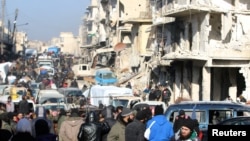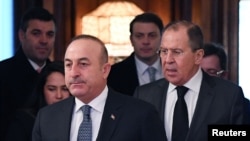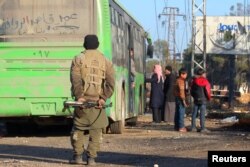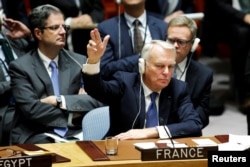The evacuation of the besieged city of Aleppo, Syria, should be completed in no more than two days, the foreign ministers of Russia and Turkey said Tuesday.
More than 37,000 people have been evacuated and the goal is have all remaining people in Aleppo removed by Wednesday, Turkish Foreign Minister Mevlut Cavusoglu said Tuesday in a Twitter post.
After a meeting Tuesday in Moscow among the foreign ministers of Russia, Turkey and Iran, Russian Foreign Minister Sergey Lavrov told reporters the three nations used their influence to force the evacuation, suggesting they have become the main powerbrokers in Syria's nearly six-year conflict.
The foreign ministers drafted a proposal that Russia said amounts to a blueprint for a cease-fire in Syria and potentially an end to the war. The urgency for Russia intensified after its ambassador to Turkey was assassinated Monday in Ankara by a man shouting, "Don't forget Aleppo."
The foreign ministers agreed to guarantee peace talks and to expand the cease-fire throughout Syria. But the broader cease-fire would exclude the militant groups Islamic State, the Fatah al-Sham Front and the Lebanese militant group Hezbollah, which supports the Syrian government.
"Iran, Russia and Turkey are ready to assist in preparing the agreement in the making between the Syrian government and the opposition and to become its guarantor," Lavrov said in a joint statement from the three countries.
Hezbollah threat
Meanwhile, Hezbollah threatened Tuesday to attack the last rebel-held area of Aleppo and said Syrian forces have issued their final call for people to leave an area in the city's eastern districts that remains under the control of opposition troops.
Syrian activists estimate up to 3,000 people remain in eastern Aleppo, which rebels seized in 2012 as part of a strategy aimed at toppling Assad's government. Since September, the opposition forces have gradually ceded control as the Syrian army and its Russian allies pressed an air offensive that systematically flattened the territory and Russia-backed Syrian ground forces pushed in.
Israeli Prime Minister Benjamin Netanyahu said Tuesday that Israel would consider bringing wounded refugees from Aleppo to Israeli hospitals for treatment.
"I've asked the foreign ministry to seek ways to expand our media assistance to the civilian casualities of the Syrian tragedy, specifically in Aleppo," Netanyahu told a group of foreign reporters in Jerusalem.
Israel has treated many wounded in the Syrian civil war over the past three years, although Israel and Syrian are formally in a state of war.
The United Nations Security Council unanimously approved a resolution Monday urging the immediate deployment of U.N. monitors to observe the evacuations from Aleppo. The U.N. said Tuesday that 20 additional monitors will be sent to Aleppo.
"This will almost triple the number of international staff currently deployed in Aleppo," U.N. spokesman Jens Laerke said Tuesday at a Geneva news conference. The U.N. monitors are in Damascus, and Laerke said they will travel to Aleppo "as soon as possible."
The approval of the French measure came despite long-standing divisions on the 15-member council that saw Syrian government allies Russia and China repeatedly veto earlier Western proposals aimed at easing the months-long Aleppo onslaught.
Complex negotiation
The evacuations are subject to highly complex and tense multi-party negotiations involving anti-Assad rebel factions, Iranian, Russian and Syrian commanders, as well as Hezbollah. In exchange for evacuations from Aleppo, the government has demanded people be allowed to leave the villages of Foua and Kefraya in Idlib province, which have been under rebel siege.
More than 70 percent of the buildings in the western Aleppo countryside have been destroyed and there is an acute shortage of food and medical supplies there, too, according to opposition leaders and activists.
VOA’s Jamie Dettmer contributed to this report.








